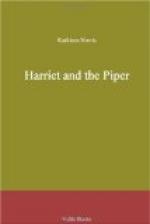She was not looking at him. Her eyes were on Richard Carter.
“I believe you would ruin her life!” she said, deliberately.
“Thank you,” Richard said. “I think that is all, Mr. Blondin. I was aware that you had—misunderstood Mrs. Carter when you made that statement!”
“Not quite all,” Blondin persisted. “You believe that Nina would be wiser not to marry me?” he asked Harriet.
“You—” She cleared her throat. “You know that I think so!” she said.
Blondin laughed.
“And now, Mr. Blondin, you will kindly leave my house!” said Richard.
The other man was watching Harriet, with a menace in his narrowed eyes. White lines had drawn themselves about his tightly closed lips, yet he was smiling. He had lost the game, truly, but she knew he would play his last card, just the same. The suavity, the calm of years fell from him, and his voice deepened into a sort of cold and quiet fury as he said:
“One moment, Mr. Carter. Why don’t you ask your wife what makes her think I won’t make Nina a good husband? Why don’t you ask her if she has been hiding something from you all this time? Why don’t you ask her if she herself wasn’t madly in love—and with me!— when she was Nina’s age, and whether she was married in my studio, to me, ten years ago—!”
He had shot the phrases at her with a distinctness almost violent. Now his dry voice stopped, but his swift, venomous look went from the silent man at the desk to the silent woman who stood before him. Before either moved or spoke he spoke again.
“Ask her—she’ll tell you! Ask her!’
“Be quiet!” Richard said. “I don’t believe one word of it!” And then as the girl neither raised her eyes nor attempted to speak, he asked her, encouragingly and quickly: “Harriet, will you tell him that not one word of that is true?”
Harriet had risen, and was standing at the back of the carved black chair with both her hands resting upon it. She had looked quietly at Blondin, when he began to speak, and the beautiful white breast that her black evening gown left bare had risen once or twice on a swift impulse to interrupt him. But now she was looking down at her laced fingers, with something despairing and helpless in the droop of her bright head and lowered lashes.
It had had its times of seeming frightful to her, this secret, in the troubled musings of the past year. But it had never loomed so horrible and so momentous as now, in the silent library, with the eyes of the man she loved fixed anxiously upon her. He had trusted, he was beginning to admire her, and like his wife and his daughter and his mother, she had failed him.
“Harriet?” he said in quick uneasiness. She raised her head now, and looked at him with weary eyes devoid of any expression except bewilderment and pain.
“Yes,” she said, simply. “That is all—quite true. It sounds—” she hesitated, and groped for words—“it sounds—as if—” she began, and stopped again. “But it is all quite true!” she finished, in the troubled tone of a child who is misunderstood.




